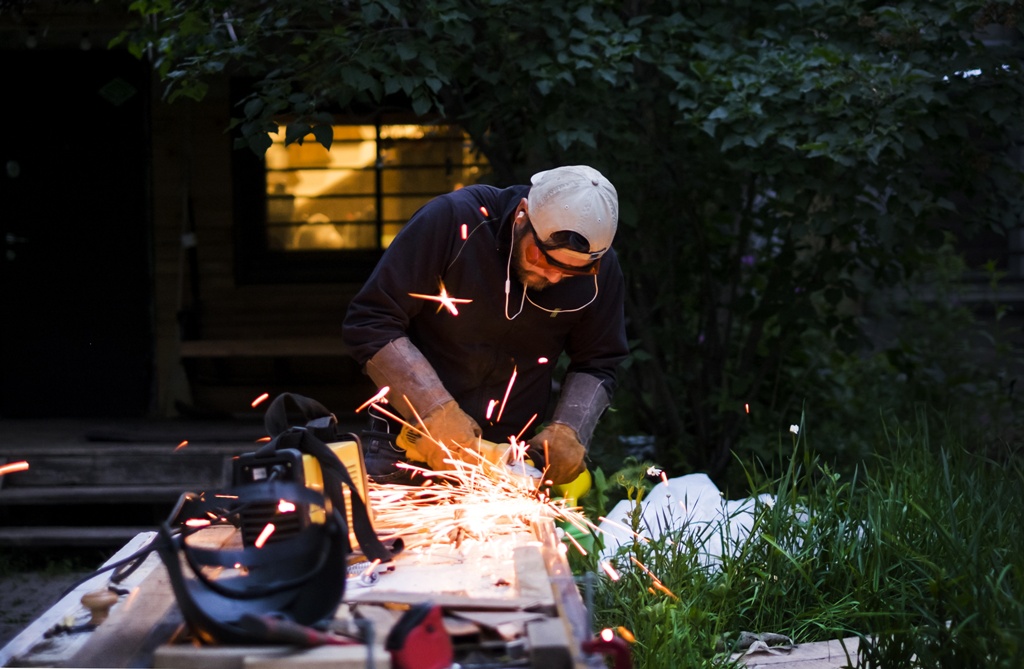There are many practical skills one can learn. Some people even study these skills as hobbies, while others do it to become constructive. Woodwork, gardening, and even welding are quite famous and sensible activities to learn. And, besides, you’ll never know when the skills will come in handy.
But, as a homeowner, there are specific benefits to acquiring a skill or two. This is especially true for welding as it can be advantageous in so many ways. Perhaps, you think that it’s a bizarre ability to learn. However, you’ll be surprised at how popular it is as a general skill and as a career choice.
Even if you’re not interested in pursuing welding as a profession, it’s still going to come in handy at home. Besides, it doesn’t even require a degree! Anyone can learn it, and you can even pick it up as a simple hobby.
Some artists specifically use metal and welding as their medium. They feature their works in galleries, and some of these pieces can be worth a lot of money!
However, it’s essential to keep in mind that welding is also an intricate process. There are many kinds of welding processes, and each has its unique purpose and function. For instance, cold welding is a unique process that doesn’t involve heat at all. How one can connect metal without any heat is all explained here: https://weldingheadquarters.com/cold-welding/.
Generally, the types of welding processes you can learn might be limited. Other more complex welding branches are interesting, but they are tailor-made for specific applications, such as underwater welding. Nonetheless, welding as a hobby or picking it up for handy work at home is a more straightforward process that anyone can learn.
So, if you’re a homeowner, here are some of the reasons to learn to weld:
1. You don’t need a degree
If you’re interested in learning to weld, you can go to a vocational school. Some community colleges or universities can also teach you how to weld, but it is part of a curriculum. It’s terrific to learn welding in an institute. This is because there’s quite a number of techniques, safety precautions, and other essential details you’ll need to master.
However, if you can’t learn welding in an institution, asking someone professional might be the right choice for you. Perhaps, there is a metal or welding fabrication nearby where you can take a tour. You can watch experienced welders in action to get familiar with the whole process. You can even talk to them about getting an apprenticeship.
2. Free supplementary knowledge
In addition to actual classes or an apprenticeship, you’ll need to do your research and homework to enhance your learning. There are YouTube tutorials, books, and even online articles that can help you get the essential tips and information you need.
3. Do essential repairs on your own
Working with metal is extremely helpful at home, significantly if you have damaged metal pieces. Gates, furniture, and other components in your home might require fixing. With a simple weld, you can repair an item quickly and easily. You won’t need to hire anyone to make minor repairs!
4. Start DIY projects
With just a welding machine, metal pieces, skills, imagination, and creativity, you can make all kinds of articles you can use in your home. From making your work station and welding table to other pieces, like racks, shelves, and even a fire pit, you can create anything that you can envision.
5. Save your money
With the skills you have, you won’t need to hire contractors or professional welders to do projects for you. Welders can be very expensive, primarily when employed to create more artistic projects, like a gorgeous gate.
Save your money on repairs that you can do yourself. And, with enough experience and tinkering around, you might be able to create artistic projects, like an elegant fence or gate, or even decorative pieces.
6. Get additional income
Once you’re confident in your welding skills, you can create pieces that you can sell. Doing minor repairs for friends and family can also get you a few bucks. But, doing it professionally is quite a lucrative career. You might even be interested in starting a welding business!
Of course, doing it professionally or starting a business will require certifications, as well as specializations. But, nothing is impossible if this is a direction that you’re seriously considering.
7. You can be a helpful neighbor
As mentioned, you can do some repairs in exchange for money. But, if you want to, you can do it for free. Helping out your neighbors with some repairs on their belongings won’t be too difficult. Most importantly, it will mean a lot to them, especially if it’s for items with sentimental value.
8. It’s a great hobby
Welding doesn’t have to be stressful. You don’t have to worry about being a professional at it right away or at all. Creating pieces that you like can be quite meditative. The projects don’t always have to be usable home furnishings. You can even make artistic masterpieces of your own.
9. It’s affordable
Everything you need to start welding won’t set you back too much at all. It’s quite affordable in comparison to other materials for projects or skills. The most expensive will be the welding machine, but there are brands that would surely match your budget.
Here are the things you’ll need for your welding kit:
- Welding machine
- Welding wire
- Gas
- Welding cart
- Right-angle grinder
- Carbide scribe or awl
- Wire brush and chipping hammer
- Magnet square or miter clamp
- Welding pliers
- Welding helmet
- Welding gloves
- Other protective gear
This is an essential list of the things you’ll need. But, you can add more to this list in the future, depending on what you’ll need. It’s best to have the necessary protective gear to protect yourself and avoid any accidents. Investing in the best welding helmets will be great, especially for protecting your sight.

10. It’s fun
Just like any other skill you can learn, welding is also fun. While it seems like a very ‘handyman’ type of pursuit, it’s quite artistic and straightforward. Unlike other mechanical skills, welding isn’t always concerned about home improvements or repairs, like plumbing. In comparison, welding is more free-flowing and creative.
Some welding project ideas you can try are tables, benches, a welding cart, stools, shelving, seating bench, firewood rack, bookends, desktop organizers, plant stands, and sculptures! If you’re happy with your projects, they can also make terrific gifts!
Other Tips When Learning To Weld
You’re probably very intrigued by welding at this point, and you’re in for an exciting journey. But, there are some things you should keep in mind when you start welding. Here are some of them:
- Be cautious: As you may already know, welding is terrible for your eyes. Always keep your protective shield on when you’re doing any welding.
- Start with wire welding: Since you’re a beginner, start with wire welding because it’s a simple process.
- Know your materials: Welding type will depend on the materials. For most metals and thicker metals, you ought to use MIG.
- Efficiency: When shopping for a machine, ask for one that is beginner-friendly or easy to use in general.
- Know your consumables: The metal and consumable strength or melting point should match. Consumables are the wires, electrodes, or filler material you’ll be using to weld.
- Be careful with voltage: For thicker metals, you’re required to use higher input voltage.
Safety Precautions For Welding At Home
Since you’ll be welding at home, you must take safety seriously. It can be harmful to your eyes, cause burns on you, affect other people, or even start a fire. Getting your workstation as safe as possible is necessary before you begin welding.
Follow these steps to avoid any untoward incidents while welding:
- Remove all flammable items to avoid fires.
- Use flame-resistant blankets to make a welding shield.
- You can use transparent screens that can block UV rays if you want to work with the garage open.
- Always have two fire extinguishers nearby.
- Woodworking should be away from your welding spot.
- Always clean the area to get rid of any flammable materials.
- Ensure you open a window and turn a fan on if the garage and your home share ventilation.
- Weld when you’re clear-headed. Avoid welding when you’re under the influence of alcohol or drugs.
Conclusion
Welding is a skill that anyone can learn. It doesn’t require prior skill; you don’t need to have a degree, and you don’t need to spend a lot of money to get into welding. You might find yourself feeling accomplished as a handyman or an artist. It can even open up career opportunities for you. But, merely doing it at home is perfectly fine as well.
It’s a great way to get your creative juices flowing. Welding is also an efficient skill that can come in handy at any time. Best of all, welding is a continuous learning process, where there is no ceiling for improvement.






